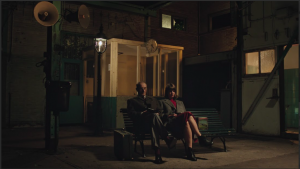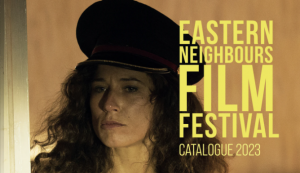
Love Is Not an Orange
dir. OTILIA BABARA
DUTCH PREMIERE
An impressive, award-winning film that dives into the privacy of thousands of Moldovan families in the period when the Soviet Union fell apart. Through archive footage, the director shows the impact of the separation of mothers and their children, as women moved abroad to work and provide for their families.
When Moldova gained independence in the early ’90s, women left the country in large numbers to work abroad and provide for their families. They sent home boxes filled with gifts and food; in return, their children would send videotapes. The videos allowed the mothers to watch the lives of their children and see how they were growing up without a parent. The film uses private archives to give an intimate glimpse into a generation of mothers and children torn apart in order to survive as their country transitions from communism to capitalism.
SHOWTIMES
Thursday, 23 November – 20:30 | Special Guest: director Otilia Babara
Friday, 24 November – 14:30 | Special Feature: Masterclass + Q&A with director Otilia Babara
LOVE IS NOT AN ORANGE | 2022 | 73 min | Moldova, France, Netherlands, Belgium
| PRODUCTION | Hanne Phlypo – Clin d’oeil; Basalt Film, Alegria Productions, Altfilm |
| CAST | Adriana Bitca, Alina Echimenco, Ecaterina Suricov, Olesea Svecla |
| SCREENPLAY | Otilia Babara |
| EDITING | Pierpaolo Filomeno |
| SOUND | Mark Glynne |
| LANGUAGE | Romanian |
| SUBTITLES | English |
FESTIVALS & AWARDS (SELECTION)
Ji.hlava International Documentary Film Festival, 2022 – Silver Eye Award for Best Film | DOK Leipzig, 2022 – World Premiere | Trieste Film Festival, 2023 – CEI Award | Visions du Reel, 2023 | Doc Fortnight: MoMA’s International Festival of Nonfiction Film and Media, 2023
DIRECTOR’S STATEMENT
As a child growing up in post-soviet Moldova, I was bewildered by the fact that a lot of my friends were growing up without their mothers, who had left to work abroad. I was also fascinated by the boxes full of gifts these women would send to their kids on a regular basis. Oranges, chocolates, jeans, plastic dolls – countless goods that we had never seen or tasted before. This was a great source of excitement, and it brought hope that we would be able to live well one day. During my research, I discovered that while these boxes were arriving from abroad, the children and their fathers would record videotapes to send to the mothers. I started gathering a lot of these tapes from different families and I was immediately struck by the way people used this medium to communicate. These archives – in their ability to bring the collective experience of migration into the film – grew to become the story itself. What started as a fascination for the way people communicate turned into an interest in the visible contrasts between what is happening in our lives and what we decide to share with others… Following the collapse of the Soviet Union, Moldova opened itself to the world in great part because of these mothers. They showed us another reality, another way of living, one box at a time.
DIRECTOR’S BIO
Otilia Babara is a documentary filmmaker from Moldova currently based in Brussels. She holds a degree in documentary filmmaking from the Docnomads European Master program (Belgium, Hungary, Portugal) and is a 2013 Berlinale Talents fellow. She directed and produced the short films Irene (2015), selected for several international film festivals, and Women on Canvas (2009), awarded in Astra Film Festival and Cronograf Film Festival. She is drawn to those who usually go unnoticed. Her films expose big wounds hidden in small details and she’s fascinated by untold stories of women.









